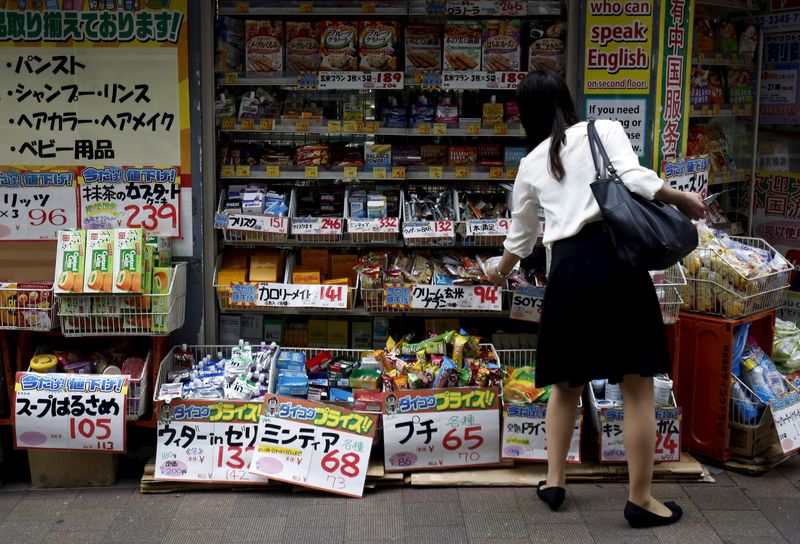By Leika Kihara
TOKYO (Reuters) - Japan's household spending unexpectedly fell and inflation stalled in June, heightening the chance the economy may have contracted in April-June and casting doubt on the central bank's view growth will rebound solidly in the current quarter.
Friday's batch of soft data underscores the challenges the Bank of Japan faces in reflating the economy to meet its ambitious 2 percent price target, and may re-kindle expectations of additional monetary stimulus later this year, analysts say.
The BOJ has signalled it feels no need to expand stimulus now, stressing that it will look through the effect of last year's oil rout that is mainly behind the slowdown in inflation.
But some analysts warn it may be forced to act later this year if consumption fails to pick up, prolonging the soft patch and discouraging companies from raising prices.
"If the BOJ were to ease this year, it will probably be in response to weakness in the economy than to inflation figures," said Yoshiki Shinke, chief economist at Dai-ichi Life Research Institute.
"Risks to the economic outlook are clearly tilted to the downside and with consumption so weak, we may not see a clear rebound in growth in July-September as the BOJ projects."
OUTLOOK MURKIER
Annual core consumer inflation, which includes oil products but excludes volatile fresh food prices, rose 0.1 percent in June, government data showed, slightly exceeding market expectations of no change.
But core consumer prices in Tokyo, a leading indicator of nationwide inflation, fell 0.1 percent in July, marking the first annual decline since April 2013.
More worryingly, household spending fell 2.0 percent in the year to June after rising 4.8 percent in the previous month, confounding market expectations for a 1.7 percent increase.
While the government blamed rainy weather for deterring shoppers, weak demand for cars and housing suggest the rising cost of living is denting appetite for big-ticket items.
The soft spending figures, used to calculate GDP, reinforced views the economy probably contracted in the second quarter.
It also cast doubt on the BOJ's rosy scenario betting that a tightening job market will nudge up wages and boost consumption, helping achieve its price target by around September next year.
Many analysts agree with the BOJ's view that growth will rebound in the third quarter. But there is uncertainty on how strong the pick-up will be given soft global demand, particularly in Asia, that is weighing on exports and output.
Even some within the BOJ, such as board member Koji Ishida, acknowledge uncertainties surrounding the bank's rosy forecast.

"There's a risk the recent softness in exports and output may hurt corporate sentiment just when companies were beginning to turn more aggressive on investment," he said on Thursday.